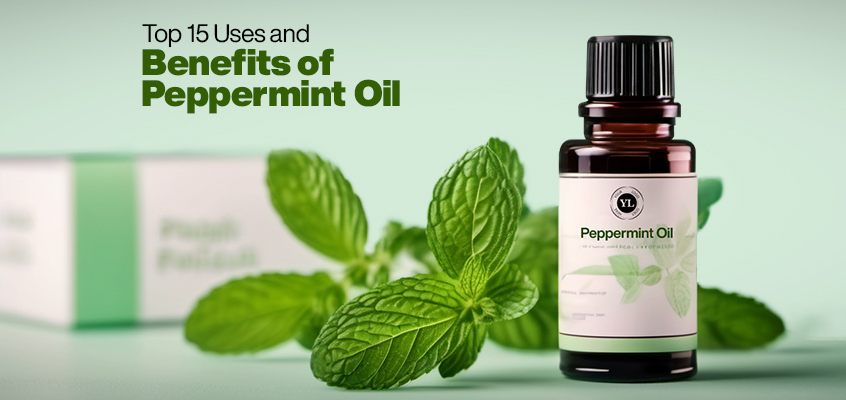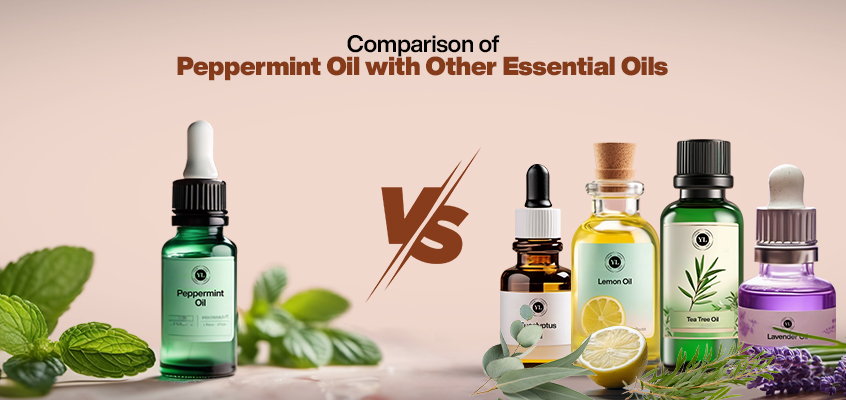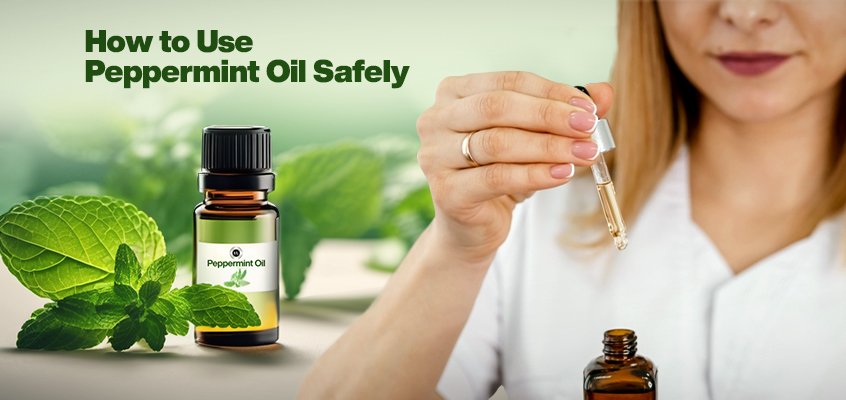All About Peppermint Oil

Peppermint oil, derived from the peppermint plant, is renowned for its invigorating scent and therapeutic properties. It's widely used in aromatherapy, personal care products, and as a natural remedy for various ailments. However, it should be used with caution due to potential side effects and interactions.
What Is Peppermint Oil?
Peppermint oil is an essential oil extracted from the leaves of the peppermint plant (Mentha × piperita), a hybrid of watermint and spearmint. Known for its refreshing, minty aroma and cooling sensation, peppermint oil has been utilized for centuries in traditional medicine and is highly regarded in modern aromatherapy and personal care industries.
Origin and Composition
The primary components of peppermint oil include menthol and menthone, which are responsible for its distinctive smell and therapeutic properties. Menthol provides a cooling effect, which is why peppermint oil is commonly found in products like muscle rubs and cold remedies.
Peppermint oil is typically extracted through steam distillation, a process that ensures the purity and potency of the oil. High-quality peppermint oil manufacturers adhere to rigorous standards to maintain the integrity of the oil, making it essential to source from reputable suppliers.
Top 15 Uses and Benefits of Peppermint Oil
Peppermint oil boasts a wide array of uses and benefits, making it a versatile addition to your health and wellness routine. Here are the top 15:
- Relieves Headaches and Migraines : The menthol in peppermint oil can help relax muscles and reduce pain. Applying diluted peppermint oil to the temples and forehead may alleviate tension headaches and migraines.
- Soothes Digestive Issues : Peppermint oil is known for its ability to relieve digestive discomforts like bloating, gas, and indigestion. It can be ingested in small amounts or massaged onto the abdomen.
- Eases Respiratory Problems : Inhalation of peppermint oil can help clear sinuses and alleviate symptoms of colds and flu due to its anti-inflammatory and decongestant properties.
- Reduces Muscle and Joint Pain : Peppermint oil has analgesic, anti-inflammatory, and antispasmodic properties, making it effective for soothing sore muscles and joints. It’s commonly found in muscle rubs and balms.
- Improves Mental Clarity and Focus : The invigorating scent of peppermint oil can enhance alertness, improve concentration, and boost energy levels. Diffusing the oil in your workspace can enhance productivity.
- Combats Nausea and Vomiting : Peppermint oil can be effective in reducing nausea and preventing vomiting, especially during pregnancy or after surgery. Inhaling the aroma or applying it to the wrists can provide relief.
- Supports Oral Health : Due to its antibacterial properties, peppermint oil is a popular ingredient in toothpaste and mouthwash. It can help combat bad breath and prevent gum disease.
- Treats Skin Conditions : Peppermint oil’s cooling and anti-inflammatory properties make it beneficial for soothing itchy skin, insect bites, and rashes. It can also help with acne when applied topically.
- Repels Insects : Peppermint oil is a natural insect repellent. It can deter mosquitoes, ants, and spiders. Using it in a spray or diffuser can help keep your home pest-free.
- Enhances Hair and Scalp Health : Adding peppermint oil to your shampoo can improve scalp health by reducing dandruff and promoting hair growth due to its stimulating properties.
- Acts as a Natural Pain Reliever : Peppermint oil can help alleviate pain from various conditions such as arthritis, fibromyalgia, and nerve pain. Its cooling effect soothes inflammation and discomfort.
- Aids in Weight Loss : Some studies suggest that inhaling peppermint oil can help reduce appetite and cravings, potentially aiding in weight management efforts.
- Supports Immune System : The antimicrobial properties of peppermint oil can help support the immune system by fighting off bacteria and viruses, making it useful during cold and flu season.
- Relieves Stress and Anxiety : Peppermint oil’s refreshing aroma can have a calming effect on the mind and body, reducing stress and anxiety levels when used in aromatherapy.
- Improves Exercise Performance : Inhaling peppermint oil before a workout can enhance athletic performance by increasing oxygen concentration in the brain and muscles, leading to improved endurance and strength.
PEPPERMINT OIL VS. OTHER ESSENTIAL OILS: A COMPARATIVE ANALYSIS
Peppermint oil, while highly valued for its distinctive properties, is just one of many essential oils used in aromatherapy, medicine, and cosmetics. Here’s a comparative analysis of peppermint oil versus several other popular essential oils, focusing on their unique properties, uses, and benefits:
Peppermint Oil vs. Lavender Oil
Composition and Properties
- Peppermint Oil: Contains menthol and menthone, known for their cooling and soothing effects.
- Lavender Oil: Contains linalool and linalyl acetate, which are known for their calming and relaxing properties.
Uses
- Peppermint Oil: Often used for digestive issues (like IBS), pain relief (headaches, muscle pain), respiratory relief, and mental stimulation.
- Lavender Oil: Commonly used for its calming effects to reduce anxiety and stress, improve sleep quality, treat minor burns and skin irritations, and as an anti-inflammatory.
Benefits
- Peppermint Oil: Invigorating and energizing, provides quick relief from pain and gastrointestinal discomfort.
- Lavender Oil: Calming and soothing, promotes relaxation, and has a gentle effect on the skin.
Peppermint Oil vs. Tea Tree Oil
Composition and Properties
- Peppermint Oil: Rich in menthol, providing antimicrobial and analgesic properties.
- Tea Tree Oil: Contains terpinen-4-ol and cineole, known for their strong antimicrobial and antiseptic properties.
Uses
- Peppermint Oil: Used for digestive health, pain relief, respiratory congestion, and mental clarity.
- Tea Tree Oil: Widely used for its antibacterial, antifungal, and antiviral properties, making it effective for treating acne, dandruff, fungal infections, and cuts.
Benefits
- Peppermint Oil: Provides a cooling sensation, pain relief, and can enhance alertness.
- Tea Tree Oil: Highly effective in fighting infections, treating skin conditions, and promoting wound healing.
Peppermint Oil vs. Eucalyptus Oil
Composition and Properties
- Peppermint Oil: Menthol-based, providing a cooling effect and relief from pain and congestion.
- Eucalyptus Oil: Contains eucalyptol (cineole), known for its strong respiratory benefits and antiseptic properties.
Uses
- Peppermint Oil: Effective for digestive issues, pain relief, respiratory congestion, and enhancing mental focus.
- Eucalyptus Oil: Primarily used for respiratory conditions (asthma, bronchitis, colds), muscle pain relief, and as an antiseptic in mouthwashes and topical applications.
Benefits
- Peppermint Oil: Soothes gastrointestinal discomfort, relieves pain, and enhances mental clarity.
- Eucalyptus Oil: Opens airways, reduces inflammation, and fights infections.
Peppermint Oil vs. Lemon Oil
Composition and Properties
- Peppermint Oil: Menthol provides cooling and antimicrobial effects.
- Lemon Oil: Rich in limonene, which offers cleansing and mood-enhancing properties.
Uses
- Peppermint Oil: Used for digestive health, pain relief, respiratory issues, and mental clarity.
- Lemon Oil: Commonly used for its uplifting scent, as a natural cleaner, for skin brightening, and for its antimicrobial effects.
Benefits
- Peppermint Oil: Provides immediate relief from pain and digestive issues, invigorates the senses.
- Lemon Oil: Enhances mood, acts as a natural disinfectant, and improves skin tone.
Each essential oil has its unique set of properties and benefits, making them suitable for different applications:
- Peppermint Oil: Best for digestive issues, pain relief, and mental stimulation.
- Lavender Oil: Ideal for stress relief, improving sleep, and skin care.
- Tea Tree Oil: Excellent for treating infections, acne, and skin conditions.
- Eucalyptus Oil: Superior for respiratory health and muscle pain.
- Lemon Oil: Great for mood enhancement, natural cleaning, and skin brightening.
Choosing the right essential oil depends on the specific needs and desired effects, as each oil offers unique therapeutic benefits.
How to Use Peppermint Oil Safely
While peppermint oil offers numerous benefits, it’s important to use it safely to avoid adverse effects. Here are some guidelines:
- Dilution : Peppermint oil is highly concentrated and should always be diluted before topical application. A common dilution ratio is 2-3 drops of peppermint oil per tablespoon of a carrier oil like coconut or jojoba oil.
- Inhalation : For respiratory issues or mental clarity, add a few drops of peppermint oil to a diffuser or a bowl of hot water and inhale the steam. Avoid direct inhalation from the bottle, as it can be overwhelming.
- Oral Consumption : Only consume peppermint oil if it’s food-grade and recommended by a healthcare provider. Use sparingly and dilute it in water or a carrier oil.
- Patch Test : Before using peppermint oil on your skin, perform a patch test to check for any allergic reactions. Apply a small amount of diluted oil to your forearm and wait 24 hours to ensure there’s no irritation.
- Avoid Sensitive Areas : Do not apply peppermint oil to sensitive areas such as the eyes, mucous membranes, or broken skin. If it accidentally comes into contact, rinse thoroughly with water and seek medical attention if necessary.
Risks, Side Effects, and Interactions
Despite its many benefits, peppermint oil can pose risks and side effects, particularly if not used correctly. Here are some potential issues to be aware of:
- Skin Irritation : Undiluted peppermint oil can cause skin irritation or allergic reactions in some individuals. Always dilute the oil and perform a patch test before widespread use.
- Respiratory Issues : Inhaling peppermint oil in high concentrations can cause respiratory irritation, particularly in individuals with asthma or other respiratory conditions. Use with caution and avoid direct inhalation.
- Digestive Problems : Oral consumption of peppermint oil can cause heartburn, nausea, or vomiting if taken in large amounts. Stick to recommended dosages and consult a healthcare provider before ingestion.
- Drug Interactions : Peppermint oil can interact with certain medications, including those for blood pressure, diabetes, and liver conditions. Consult with a healthcare provider before using peppermint oil if you’re on medication.
- Pregnancy and Breastfeeding : Pregnant and breastfeeding women should use peppermint oil with caution. While it can help with nausea, excessive use can potentially lead to complications. Always consult with a healthcare provider before use.
- Toxicity in Pets : Peppermint oil can be toxic to pets, especially cats and dogs. Avoid using it in areas accessible to pets and consult a veterinarian for safe usage around animals.
Choosing a Reliable Peppermint Oil Manufacturer and Supplier
When selecting peppermint oil, it’s crucial to choose products from reputable manufacturers and suppliers. Here are some tips:
- Quality Assurance : Look for manufacturers that provide clear information about their extraction methods and quality control processes. Third-party testing and certifications can also indicate high-quality products.
- Purity : Ensure the oil is 100% pure peppermint oil with no additives or fillers. Read the label carefully and research the supplier’s reputation.
- Transparency : Reputable suppliers will be transparent about the sourcing of their peppermint oil, including the origin of the peppermint plants and their farming practices.
- Customer Reviews : Check customer reviews and testimonials to gauge the quality and effectiveness of the peppermint oil from different manufacturers and suppliers.
Peppermint oil is a powerful essential oil with a myriad of benefits ranging from pain relief and digestive support to improved mental clarity and respiratory health. However, it’s essential to use it safely and be aware of potential risks and side effects. By choosing high-quality products from reputable manufacturers and suppliers, you can enjoy the numerous advantages that peppermint oil offers while minimizing any adverse effects.
For those interested in integrating peppermint oil into their health and wellness routines, always start with small, diluted doses and consult with a healthcare provider, especially if you have existing health conditions or are on medication. With proper use, peppermint oil can be a valuable addition to your natural remedy toolkit.
You May Also Like:



